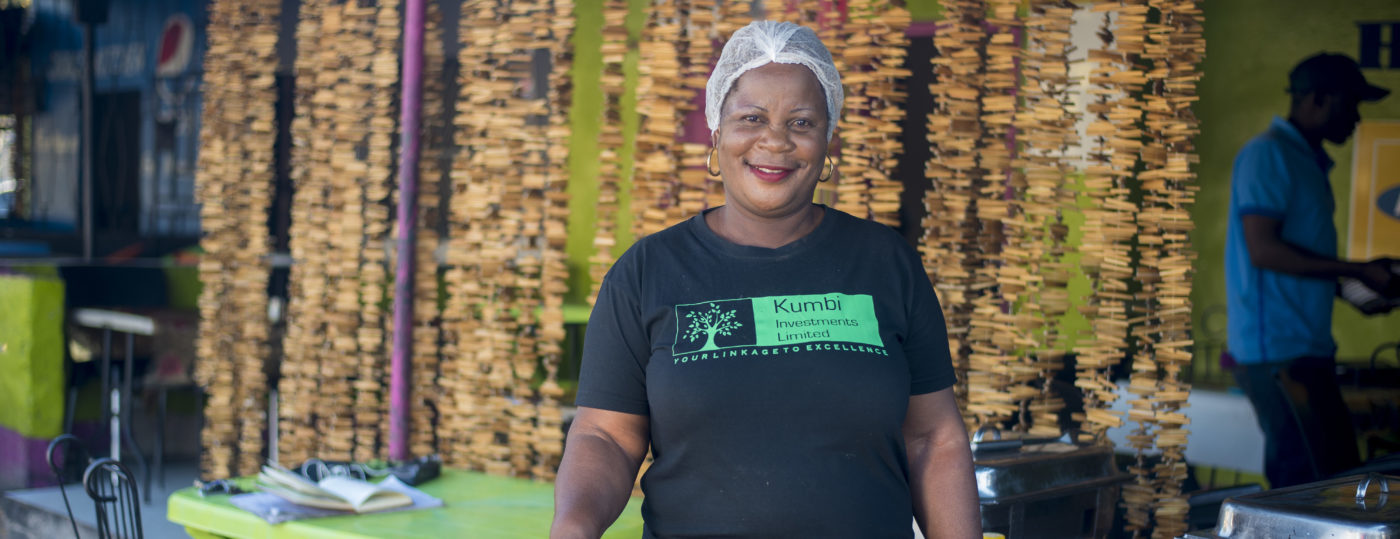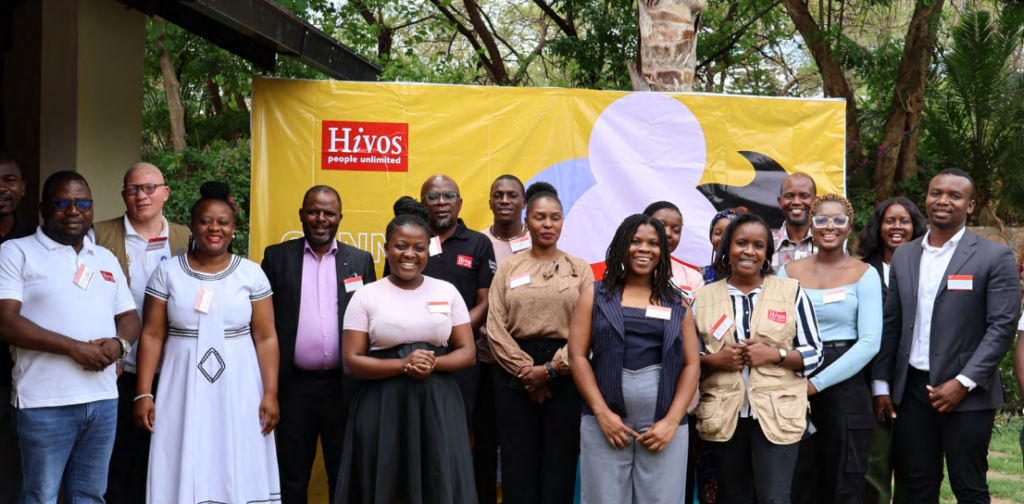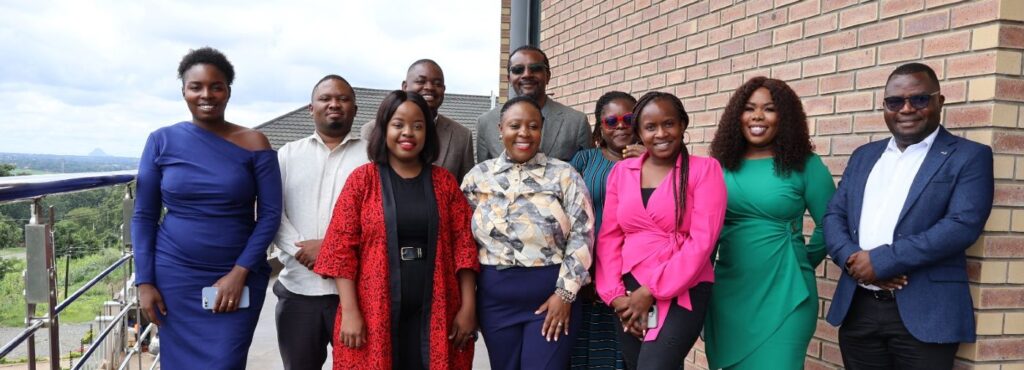A recent exhibition, curated by the Sustainable Diets for All program in Zambia for World Food Day, explored the changes needed to promote healthy and sustainable foods – supplementing the traditional maize-based staple nshima (hard porridge), from farm to plate.
In the photo exhibition illustrated in this photo blog, ten Zambian men and women reflect on their diet and the importance of food in their lives. Representing a cross section of society, including government, civil society, farmers, and the entertainment industry, their testimonies show a food system that has the potential to embrace the country’s agricultural bio-diversity, but is instead largely dominated by one crop – maize. They tell of the threats that are posed by a growing fast food industry in Zambia. And they reflect on how the climate emergency undermines food and nutrition security while also being a potential driver for greater crop diversification.
Daisy Phiri is a mother of three and she is a hotelier by profession. In her line of work, she is used to welcoming guests and she enjoys cooking for them too.
“It’s an art. Cooking is an art and it excites me a lot, especially when I cook my favourite meals and people appreciate what I have done. I learnt from my mum that every meal, should be a balanced meal consisting of all the nutrients that the body needs. To nourish the body, to make it function normally, in the correct way.
Growing up with a nutritionist mom, I learnt how to always incorporate vegetables at every meal. And how to always incorporate different kinds of foods, especially for children. I make sure that we stock up with some millet meal and also cassava meal so that we have alternatives to maize nshima.
“Maize is the number one crop in the country. This is not just a threat to food security, but also to nutrition, which is the most important”. As the former Minister of Agriculture, Hon. Dora Diliya was doing everything possible to return to some of the traditional crops that people were used to: cassava, sorghum, millet and even rice and potatoes.
“People only think of the maize, the nshima, with whatever they eat it with, as the only food. But we have realised that if the country is going to go forward in terms of agriculture development but also in terms of nutrition, we have to diversify. Why do Zambians or myself, why do we like so much to eat nshima? I think the honest answer is habit. Food becomes a habit. It becomes something that you grow up with and you become nostalgic about it and that’s what most people know”.
She strongly believes that if Zambia is going to have sustainable diets, diets that are good for the health of our citizens, crop diversification is key.
As a music icon, Slapdee’s days are filled with high activity and he is required to be on the road for long stretches of time. So, protein is critical. “Protein is the kind of food that fills you up, and gives you the energy and burns longer. It keeps my muscles and vocal cords from being overwhelmed, unlike with fats and oils.”
Slapdee has always thought of taking a keener interest in knowing the sources of his food. This influenced him to become a nutrition champion with Civil Society Scaling Up Nutrition (CSO-SUN). In this role, he acknowledges the importance of teaching kids about healthy food. “A lot of what kids take in is learned habits. If we get it right while they are young, I think they will be set for life. CSO-SUN has exposed me to the benefits of such early intervention. The food system could deliver multiple benefits if we diversify what we farm and effectively what we eat. I think we definitely all need to be demanding variety on our plates.”
A nutritionist by training, Hon. Chisangano chooses meals which are locally available. “I have a garden where I grow a variety of vegetables. If what I may want to eat is not found in the garden then I will go to the market. I keep chickens so these are readily available when I want to eat them. And when I want to eat beef that’s when I go to supermarkets, butcheries or any other shops that sell meat. By eating these local foods I know that am supporting a local farmer, but more importantly I can relate with where this food is coming from.”
Hon. Chisangano is substituting maize nshima for nshima made from millet or sorghum. For her, a sustainable diet consists of a variety of foods that are easily accessible, affordable, and can be easily be prepared.
Mr. Bishop Zulu, a farmer in Chongwe district and an active member of Chikondi agricultural group. Born and raised in a village setup with his mother, who could only afford homegrown, home-prepared food, Mr. Zulu ate foods like pumpkin leaves and mushrooms, and had no idea what cooking oil was.
“I will not lie, from birth, till date, I have never set foot in a hospital. Do you know why? Because my whole life, I’ve consumed nothing but organic foods, free from all the toxins,” he said. Though he was born in 1973, Mr. Zulu feels that he looks much younger because of the food choices he has made over the years.
Elias Phiri, a youth member from Chongwe district, says he would love to get people to reduce their consumption of meat products because he believes that causes many diseases.
“To me, a healthy meal is not all about vegetables cooked with tonnes of oil. Eating dried vegetables from my own garden and some healthy meat from a trusted source is my go-to healthy diet” he said.
Elias explains that although most foods are expected to be prepared with cooking oil, it is important to keep a limit on the amount of oil one uses.
Why put oil on meat when it is naturally fatty? People need to start thinking twice about what they consume.
My favorite meal is dried fish, nshima and pumpkin leaves. Why? Because they are healthy
Loveness Bwalya was lucky to grow up in a setup where she was taught how to eat healthy foods. In today’s world, most people’s diets consist of genetically modified foods (GMOs). They eat fast foods to match their fast way of life.
“I honestly don’t feel the need to eat all the spicy and fancy foods because I know those foods may be tasty and delicious, but they have little to no nutritional value,” says Loveness.
She acknowledges that most Zambian men and women grow up eating nshima and know very little about other foods and their nutritional value. She questions why that is.
Mr. Everisto Banda is among the few farmers who practice conservation farming. He grows cassava, sorghum, maize, ground-nuts among other crops. He has opted for using less fertilizers and more compost manure. Being a multi-purpose farmer, from crop production and livestock production to fish farming, he says that living a chemical-free life is easy.
“The food we have today causes diseases and young ones affected have no idea that it is because of the food they eat. This change in diet is terrible and that is why I am maintaining my traditional diet.” he says.
“We eat nshima because this is the food we grew up eating. What our parents fed us when we were young is what we have continued to eat,” says Mr. G. M. Chiboleka, a 65-year-old farmer and Headman in Chikwangala.
Not only does Mr. Chiboleka know exactly what he eats, he also understands the nutritional value. When asked how food in Zambia has changed over the years, he stated that the old ways were better, as foods had more nutritional benefits and less artificial chemicals. He further advised people to refrain from eating certain foods such as broiler chickens (Chicken bred and raised specifically for meat) because of the chemicals and feed that are used to boost their growth.
“Some food has brought us diseases. Especially if you look at the amount of cooking oil people use to prepare these foods. People are starting to have heart problems because of that,” he said.
“In my time, people would get to their 80s and still look 21. Nowadays, a 21-year-old is complaining about their legs, their back, and their heart or having high blood pressure, which was mainly found in old people back in the day,” he concluded.








